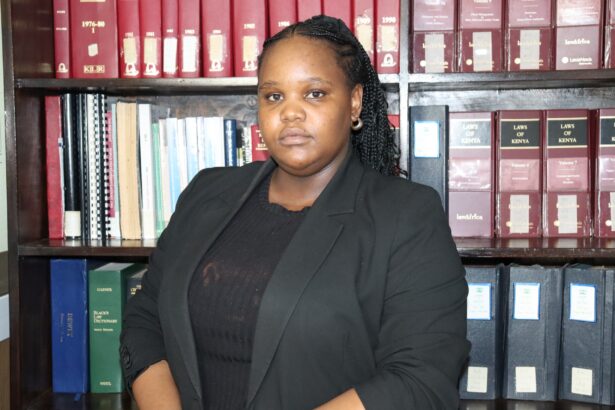Mondekazi Ntshele
The Constitution of Kenya is framed to usher people as custodians of democracy. It does this by granting people the opportunity to be involved and taken into consideration by authorities in all public processes ranging from policy-making, judicial processes, and ultimate decision-making through citizen participation.
Citizen participation is one of Kenya’s Constitutional Principles and Values of Democratic Governance which simply put people at the centre of every decision-making. The principle means “to give powers of self-governance to people and enhance their participation in the exercise of the powers of the state and in making decisions affecting them”.
The purpose of Citizen participation in democratic governance is to ensure that there is a relationship between the people and the arms of government in various levels of spheres. Although these arms of state function independently, checks and balances amongst them remain paramount.
Over the years judicial integrity has been under scrutiny by citizens mostly in cases of the rule of law and politics. The rationale behind it is that citizens lack confidence in the judiciary due to various reasons. One of the primary reasons is the recruitment process of judges laid out by the legislative framework. According to Article 166 of the constitution, the president shall appoint the judges in accordance with the recommendation of the Judicial Service Commission (JSC). It is worth understanding that the president is a political figure and, in many instances is driven by political determination. Therefore, uncertainty and distrust of the citizens in the judiciary is inescapable.
The recruitment process of judges is a determining factor for prospective judges joining the bench in Kenya and adjudicating over the matters of citizens. This determination illustrates the fact that judiciary does not operate in isolation from the citizens. It is therefore key for the participation of the citizen to be geared at the forefront of judicial recruitment in Kenya.
Why is it important for citizen participation to be considered?
Representation by other stakeholders does not necessarily mean that the concerns of the citizens are presented before the JSC. In most cases, some of the organisations and associations representing the wider public of Kenya do not consider the importance of informing the citizens about judicial recruitment processes and conjoin their concerns for the presentation before the JSC.
In order to ensure that the will of the people is put into effect and not manipulated when the judicial recruitment process takes place, people should be listened to by the JSC or stakeholder representatives. The representation through stakeholders in other ways perpetuates the disconnect between people and the judiciary and creates a system where people are not perceived equal before the law.
The judiciary is key in the protection of democracy, the rule of law, and respect for human rights. In order for the state to test its level of democracy, it is necessary to have citizen participation involved. Citizens are the primary stakeholders in helping the judiciary to reflect the progression of human rights in the country. It also informs the judiciary on the standpoint of checks and balances between the arms of government.
Involving citizens in the recruitment process of judges shows a high level of respect for constitutional democracy and people as the custodians. It also enhances transparency and accountability between people and judicial institutions. When the judiciary exercises transparency and accountability it builds public confidence and support of the citizens.
The support can promote the effective functioning of the legal system and uphold the rule of law. Citizens can participate in the judiciary recruitment process by engaging main stakeholders such as Civil Societies, Non-Profit Organisations, and associations dealing with human services or governance issues.
Although representation by other stakeholders remains paramount, it does not necessarily mean that the concerns of the citizens are presented. In most cases, some of the organisations and associations representing the wider public of Kenya do not consider the importance of informing the citizens about judicial recruitment processes and collaborating their concerns for the submission before the JSC.
In addition, the stakeholders should take it upon themselves to consider the capacity building of citizens in the judicial recruitment process in Kenya. Pre-selection engagement between stakeholders and citizens should be the cornerstone to help citizens engage with the process of recruitment of Judges in Kenya.
The involvement of citizens can help the judiciary to receive valuable insights into the qualities and characteristics they expect from judges. It does not only allow citizens to engage the custodian of the legal system but, can help in the selection of qualified and competent candidates, thus enhancing the overall quality of the judiciary.
When people get involved in the process of recruitment, they get a sense of trust and confidence in the institution and the judgments issued by the courts. When people gain confidence in the selection process, they are more likely to respect and adhere to the rulings made by the judiciary.
The process of looping the citizens in the process fosters trust in the legal system as a whole. Citizen Participation can also serve as a safeguard against the capture of the judges by other arms of government or political influence.
While people are often represented in decision-making and judicial processes, it is also paramount for the representatives to consider the facilitation of pre-recruitment engagement of judges with citizens. In addition, the judiciary in Kenya needs an internal office that will specifically monitor and collaborate with citizens and stakeholders to build civic education on the issues of people and judicial operations.
The author Mondekazi Ntshele is a lawyer and a NOREC fellow from South Africa working at ICJ-Kenya.
Want to send us a story? Contact Shahidi News Tel: +254115512797 (Mobile & WhatsApp)


